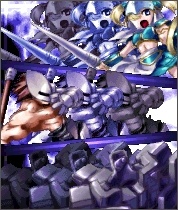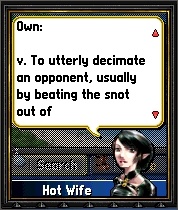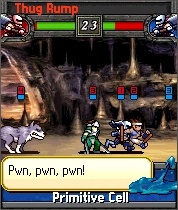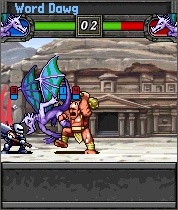One of the big promises of the N-Gage that has, up until now, gone unfulfilled has been the convergence of gaming technology and wide-area communication technology, two characteristics inherent to the device. Sega's Pocket Kingdom: Own the World, which touts itself as the world's first mobile massively multiplayer game, definitely delivers one of the most fully formed online experiences that Nokia's hybrid handheld has seen. Getting this far, though, seems to have required a lot of sacrifices in terms of depth and overall playability. Although there are also some design choices here that are simply poor, the game gets enough right that you can at least see what Sega was aiming for.

Whether you're playing Pocket Kingdom online or off, the action takes place in the Map of Ulgress, named after Griefer Ulgress, the most brutal and merciless player the world has ever seen. According to the game's mythos, his account was eventually banned, and the Map was plunged into chaos while all other players started vying for the number one slot. As one of these very players, you have to build up your armies and battle with non-player characters, as well as other players, in an effort to have your name read at the top of the "All-Time Owners Board."
Pocket Kingdom has an extremely strange self-aware tone to it, reminiscent of the .hack series for the PlayStation 2. All the in-game characters openly acknowledge that it's just a game, but there is constant reference to player characters that are fictional. That the main character in the game's mythology is just a player, rather than some kind of ancient god or evil overlord, is quite telling, but if you think too hard about it, you'll go cross-eyed. Making things even stranger is the fact that the overall presentation has a pretty traditional fantasy feel, but rather than speaking Queen's English, all the in-game characters speak in bad Internet shorthand by glibly tossing out stuff like "LOL" and "PWNED" in the heat of battle. Furthermore, the characters have similar names to match. Despite whether or not you'll get a kick out of the referential tone or find it kind of disingenuous and embarrassing, what's important here is that this design choice ultimately makes Pocket Kingdom harder to get into for those not already steeped in its culture.

For all its MMORPG posturing, though, the gameplay experience is only mildly reminiscent of games like EverQuest or Star Wars Galaxies. Rather than putting you in the shoes of a single character with a discrete experience level that you are constantly working to increase, Pocket Kingdom treats you like the general of an army. You hire (read: purchase) characters of various class types and form them into teams of four. After arming them with weapons, armor, and/or protective trinkets, all of which you'll forge yourself, these teams are sent out into the world to battle other Pocket Kingdoms, or they are sent to defend your own Pocket Kingdoms from incoming attacks. Over time, your soldiers will gain experience levels, making them more lethal in combat, and you can also apply special badges to them that can change their appearances and have significant effects on overall prowess. And unlike your usual MMORPG character, who can be resurrected after falling in battle ad infinitum, your soldiers are quite mortal. Falling in battle usually results in both a removal from the party and a loss of equipment to the ether, though a character is eventually declared "owned," at which point his or her demise is permanent. Though a penalty for failure seems appropriate, having a character permanently die (especially after you've fostered him or her through dozens of battles) feels rather severe, and makes it difficult to get too attached to any of your troops.
When you first start up Pocket Kingdom, you won't actually be able to get online. Instead, you'll have to prove yourself in the offline component, which is almost identical to the online component, except that you'll only be fighting against NPCs. It should only take an hour or two to gain enough experience to start playing online, but even then you'll probably want to log several more hours offline. There is no ranking system or anything separating the newest scrubs from high-level veterans, and your opponents will invariably mop the floor with you the first few times you log on. Once you do get a powerful enough army built, online play can be pretty fun, though it doesn't differentiate itself from the offline mode that much. There is a player-run auction system, as well as a rather clumsy messaging system. Nevertheless, aside from the naming conventions, it can be a bit difficult to differentiate between players and NPCs, and the battles themselves don't give you the sense that you're battling another person's army. The combat itself is a rather passive experience, too.
The actual battles in Pocket Kingdom are very hands-free because you have no direct control over your party during combat. Any sway you may hold over the outcome of a battle figures in before anyone crosses swords, and this sway comes in the form of choosing each unit's battle tactics and equipment. Beyond that, the combat is almost pure number crunching, which makes your role in the actual meat of the game feel kind of passive. There's no real visceral satisfaction in besting your enemy, so you'll spend the lion's share of your time with Pocket Kingdom navigating the game's numerous and kind of sluggish menus.

That the combat is largely statistic-driven feels like a purposeful design choice--and one that hardcore pen-and-paper RPG fans will probably appreciate--but the menu system just feels ham-fisted, and it makes many basic tasks needlessly arduous. For example, if you want to rank up a character, you'll need to first collect (or go in to the shop menu to purchase) the four different pieces necessary to build an emblem. Then you'll go in to the lab, select the combine menu, select the four pieces, and hope that the combination is actually successful. If it fails, which can happen rather often, you lose all four pieces you were trying to combine. If successful, you'll need to go to the party menu, pull the character you want to rank up from his or her party (because, inexplicably, you can't rank up a character while he or she is in a party), and then go back to the lab menu. Then you'll select the character and emblem, and finally, your character's rank is improved.
Just describing this process is exhausting. The fact of the matter is, in Pocket Kingdom, you will be spending a disproportionate amount of time navigating menus trying to manage your army rather than actually cutting a swath through the Map of Ulgress and climbing toward the number one spot. Considering that the N-Gage is fitted with a full 12-key pad and Pocket Kingdom makes use of only two keys, this seems like an obvious missed opportunity to streamline the interface with some kind of hotkey shortcut system, and, subsequently, the clumsy menu-based interface is one of the game's biggest weaknesses.
Though all the envelope-pushing technology in Pocket Kingdom is invested in its real-time online gameplay, the game still manages to have a decent look to it. The overworld map that you'll view as you travel from location to location does a pretty good job of giving you a sense of the world, and there's actually an organic feel to the world, with grassy plains giving way to rolling hills, then rocky mountains and massive blackened volcanoes, and so on. The combat screen is pretty fun to watch as well, largely because the backdrops look good, and the character sprites do too, in addition to animating nicely. It would have been nice if actual equipment changes altered the appearance of your character, but as it stands, you can equip a knight with a battle axe, and he'll still be carrying a sword in the combat screen. The sound consists mostly of a few jaunty little tunes and some simple hacking and slashing noises during battle. They're not bad, but then again, you can mute the game without radically changing the gameplay experience.

Despite its prominent flaws, Pocket Kingdom is still a somewhat significant landmark for the N-Gage. There is a core idea here that is quite sound, but it's unfortunately undermined by a series of poor design choices. Although those who have hung their hopes on Pocket Kingdom as being the N-Gage's killer app may be disappointed, those willing to deal with its compromises may be able to dig up some of the fun that lies at the game's center.